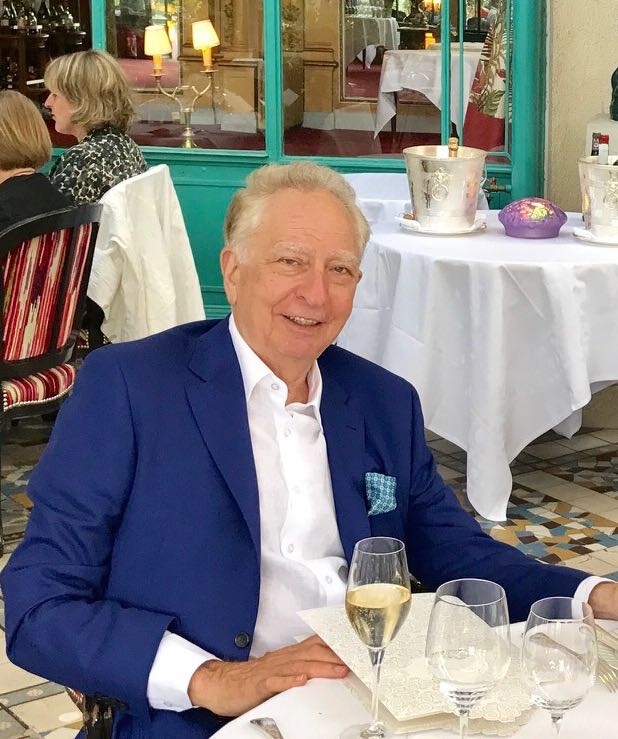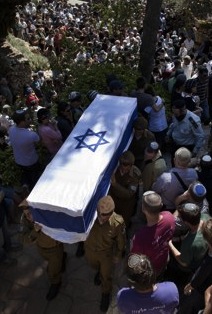To recap the story to this point, Ed Diamond, based in Paris, receives an urgent call to come to Israel from an old friend, Dov Ben-David, former deputy director of Israel's Mossad. Dov has shocking information, he says, concerning the U.S. and Israel. Diamond flies to Israel, but before they can meet, Dov is blown apart by a car bomb.
The next day, Diamond attends Ben-David's funeral at the kibbutz of Ein Gedi, by the Dead Sea.
ED COULD SMELL the lavender and myrrh the next morning as he passed Ein Gedi’s botanical garden on his way to the cemetery. He’d spent the night at the kibbutz hotel; the mild asthma attack he’d had yesterday seemed to have passed.
Today again the sprinklers were whirring, the vivid green of the lawn in stark contrast to the bleached canyons and parched mountain cliffs. The rows of tombstones were flat and unadorned, bearing names, dates, brief inscriptions. Several sturdy young men, in plain clothes but obviously military security, were dotted around the perimeter of the cemetery.
Ed threaded his way among the hundreds of mourners, many of them prominent government officials in dark suits or sports shirts, small skull caps on the back of their heads. Former Prime Ministers Ehud Barak and Bibi Netanyahu shook hands gravely. Netanyahu was not aging well, thought Ed: puffy jowls, bloated waist. Ehud Olmert huddled with the current head of the Mossad, arm around his shoulders. Ed couldn’t help feeling a certain gratification as he noted the attention that he—a rising television celebrity—was also receiving.
“Ed Diamond,” exclaimed a rasping voice behind him. “What is the illustrious American reporter doing here?” Ed turned to face a slender man in his fifties with thinning gray hair, hooded brown eyes, and a vise-like grip. It was Moshe Weinstein, once the subject of a report by Ed, just before Weinstein resigned as defense minister. “I can no longer be part of a government,” he’d told Ed in their interview, “that refuses to deal seriously with the Palestinians.” It was a headline-making statement from a one-time hawk, a man who had commanded Israel’s vaunted air force. Weinstein had since formed his own “Peace Today” party.
“Damn shame what happened to Dov,” said Weinstein.
“It’s so ironic,” said Ed. “Dov makes it through all those years risking his life on the front lines; then he retires and they get him.”
“You don’t know the whole story,” said Weinstein, reaching up to adjust his yarmulke.
“What do you mean?”
“Normally the spa’s coffee shop is fairly empty at the time the bomb went off—it’s the laziest part of the day. Dov just happened to be there. He took a plate glass window in his face.” Weinstein drew a finger across his neck. “It cut the carotid like a butcher’s knife, almost took his whole head right off.”
“Good God,” Ed shuddered. “What do the police say?”
“A very professional job. Nitrate-based explosives packed in a van. Detonated by remote control, probably a cell phone. We had hoped the Wall would end such attacks. It did for a while; somehow they’re beginning to get through again.”
“Do they know who was responsible?”
“Perhaps. About an hour ago a new Palestinian terrorist group, the Sons of the Prophet, claimed credit. They called Dov an ‘enemy of the Palestinian people’ for the things he did with the Mossad. They warned that all such enemies would suffer the same fate. ‘Allah is Great!’ and all that.”
“That was it?”
“More or less.” Weinstein paused. “Look, I don’t know much about them. I’m no longer in the government. They are supposed to be very small, very secret. But why did they go after Dov? They are playing by new rules. You probably heard that they’re also now involved with Al Qaeda—trying to produce biological weapons in Pakistan.” Weinstein shook his head. “Can you believe it? How do we make peace in this insane place?”
The cemetery was filling up. A heavyset man limped toward them. He had a shock of thick gray hair, a broad, furrowed brow, and a black ribbon in the lapel of his blazer. Ed recognized him at once. It was Dov Ben-David’s younger brother, Arik, much better known in Israel than Dov. He and Weinstein shook hands stiffly, with no pretense of friendship.
To fill the silence, Weinstein formally introduced Arik to Ed. The Israeli’s grip was dry, firm, his voice resonant, the tone of one used to command. “Shalom, Ed Diamond. I’ve heard of you.” His eyes were his most striking feature, a pale emerald green, like the inside of an iceberg. They bore right into you, thought Ed. Not necessarily hostile, just letting me know who’s in charge, like a rhino, or a leopard staking out his turf.
Arik Ben-David was a military hero in a country of military heroes—once one of Israel’s youngest generals. Ed knew the story: After being wounded by shrapnel in Lebanon in 1982, Ben-David transferred to the Mossad; then left the government a few years back to become involved in a variety of successful private enterprises—including some very lucrative clandestine arms deals with China.
“I’m sorry about your brother,” said Ed. “He was a very admirable, decent man. It must be a great loss.”
“Of course it is,” said Ben-David quietly. “Of course.” Something flickered in his eyes. He glanced at his Rolex. “Thank you for coming. Please excuse me, I have to greet others.”
“An interesting man,” said Moshe Weinstein as Ben David walked away. “Both he and Dov were involved with ridding us of radical Palestinians—PFLP and Hamas back then.”
“I knew about Dov.”
“Yes, well, the difference was that Dov regretted each killing. Arik, I think he really enjoyed it. He was actually forced out of the Mossad—too extreme. His son was killed by a Hezbollah rocket in south Lebanon. Deep down he hates the Arabs.
The sun was already high in the sky when the funeral service began. Across the Dead Sea, the pastel mountains of Jordan glimmered ghostlike through the haze. Like Ed, many of the men had removed their jackets. From where the reporter stood, he could see Dov’s widow, Esther, dressed in a short-sleeved black blouse and skirt, her daughter on one side, her son on the other. She gazed unflinchingly at the simple wooden coffin, apparently oblivious to the mourners around her. Arik Ben-David stood behind her, ramrod stiff, his large hand on her shoulder. Remembering the gruesome aftermath of the bombing, Ed couldn’t help wondering how much of Dov Ben-David was actually in the coffin.
There were a few traditional prayers, readings of poetry and texts composed by relatives and friends. The current prime minister spoke, as did the head of the Mossad and Arik Ben-David.
Then a tall, willowy woman who had been standing near Esther stepped forward. Even in somber mourning garb with no makeup, she was striking: her long chestnut hair framed an oval face, full lips, and the same remarkable pale emerald eyes as Arik Ben-David. She carried herself with the sort of poise you don’t learn, thought Ed. It was unaffected, almost regal. He glanced at Weinstein.
Gabriella Ben-David—Dov’s niece—Arik’s daughter,” Weinstein whispered, as the woman began to speak in Hebrew.
Ed couldn’t understand the words, but her voice, vibrant and clear, flowed over the mourners like a soothing balm. When she had finished, the silence was broken only by scattered sobs from the mourners and the cries of the starlings soaring on the currents of air that rose from the desert. Ed’s throat was tight. He brushed his eyes; Weinstein did the same.
At the conclusion of the service, each mourner placed a few pebbles or flowers on the newly turned earth; then they filed past the widow and her family to offer condolences. When Ed’s turn came, he took her hand. “Esther, Ed Diamond. You probably don’t remember me.” Her hand was limp. “I had dinner at your apartment in Tel Aviv a few years ago.” She stared right through him, dark circles under her eyes. It seemed she hadn’t registered a word. Ed stumbled on. “All I can say is I admired Dov so much, and I—”
She interrupted abruptly, her eyes suddenly ablaze. “I tell Dov not to call you. I tell him. But he doesn’t listen to me. He doesn’t listen.” She paused. Her lower lip trembled. “So now you are not making your interview with him, are you, Mr. Diamond? You make your trip for nothing.”
Ed was stunned by her vehemence. He opened his mouth but could find nothing to say. He was obliged to move on as Esther turned to greet the next mourner. Not sure what to do next, he wandered back through the gardens and ascended a gravel path to a wooden bench that overlooked the Dead Sea.
He sat there, gazing at the shimmering mountains of Moab and tried to fathom Esther’s violent outburst. How could he be responsible for Dov’s death? What was it Dov had wanted to tell him? Something to do with the United States and Israel, he’d said. But what? Ed frowned. This was not really the appropriate moment to ask Dov’s widow, even if she was willing to talk with him. But he had no choice: he’d already booked himself on the El Al flight early the next morning. He waited an hour until most of the mourners had left before he approached the Ben-David home.
To Be Continued
(I'll be posting further excerpts, but for just a few days, beginning December 10, you can also download the book in Kindle ebook format from Amazon.com's U.S. store for only $0.99. The book is also available on Amazon in soft-cover).

